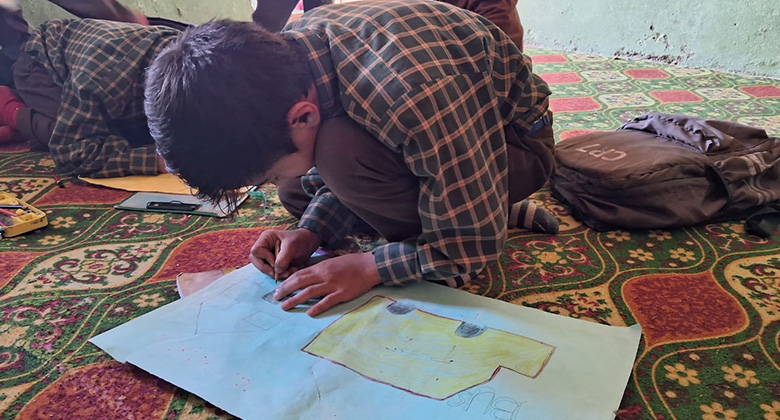
Kupwara, that distant, border-clad district of Jammu & Kashmir, stands like a place out of time – a realm where the mountains are both majestic sentinels and silent witnesses to decades of conflict. Some border areas of Kupwara remain cut off from the valley for over four months every year, owing to intense snowfall on the high- altitude border passes. The frequent disruptions caused by conflict and harsh weather conditions hinder consistent school attendance and affect the quality of education.
Here, in villages such as Yehama, life persists between extremes, where poverty winds its cruel fingers around homes, and children, like Muskaan, live half-hidden lives, weighted down by the invisible burdens of history and trauma.
At fourteen, Muskaan—her name, a bitter irony – was like a shadow moving through her days at the Upper Primary School of Yehama. The world saw a girl withdrawn, her gaze never meeting another’s, her lips rarely parting to form the smile her name promised. Illness was her constant excuse for absence, but what illness could explain the hollow look in her eyes or the silence that enveloped her? Diagnosed with Obsessive-Compulsive Disorder, Muskaan found herself adrift, as though the words of her diagnosis had chained her to an identity she never sought. Her family did not see her struggle for what it was, and her teachers, too, mistook her pain for indifference. The girl once alive with the simple joys of childhood seemed now a vessel emptied of hope.

But in life, as in fables, there are moments when the hand of fate, dressed in ordinary clothes, offers redemption. For Muskaan, this came in the form of Javid Ahmad, her class teacher. Ahmad saw the silent screams in her quiet demeanor, the invisible wounds no one else could fathom. "Muskaan’s silence wasn’t the silence of disinterest," Ahmad would later say, "It was the silence of someone carrying far too much."
It was around this time that a different kind of wind blew into Kupwara – an unexpected force, carrying with it the seeds of something new. The Piramal Foundation, in collaboration with the Directorate of School Education Kashmir, introduced an Aesthetic Literacy program across sixty schools in the region. The initiative aimed to nurture emotional expression through art and creativity, a concept so simple and yet so profound in a place like this, where trauma had too often buried emotion beneath layers of silence.
Ahmad, like many, had his doubts. How could art, in a world of such harsh realities, offer anything more than a fleeting distraction? But he opened his heart to the possibility of bringing the program to his classroom, hoping that Muskaan, too, might find some relief in its practices.

At first, Muskaan remained cautious, as though fearful that even art might betray her. She chose drawing as her medium, and what she drew reflected her inner world – dark, abstract shapes that seemed to swallow the light. Each pencil stroke was a whisper of pain, a language she had never learned to speak. But as the days passed, the heavy shades began to soften. Flowers emerged, tentatively at first, then in full bloom. The sun made shy appearances, and birds, once grounded, took to the air.
As her drawings evolved, so did Muskaan. Her once-muted presence began to take on colour. She raised her hand in class, her voice no longer trembling. She smiled – rare at first, then more often – each smile a small rebellion against the darkness that had so long consumed her. The girl who had once faded into the background now stood before her classmates, anchoring the morning assembly, her voice steady, her posture unafraid.
Her transformation did not go unnoticed. "She’s different now," said one of her classmates. "She talks to us. She plays with us during breaks." What they didn’t say, but perhaps sensed, was that something had been unlocked within her, and in that unlocking, Muskaan had found the courage to step out from the shadows.
Javid Ahmad, too, understood the deeper significance. Aesthetic literacy had not only opened Muskaan’s world, but it had also shifted the dynamics of the entire classroom. Other students, once hesitant to express their emotions, followed her lead, finding in art the freedom to reveal their own hidden fears and hopes. The program’s effects rippled outward, creating a space where creativity and emotion wove together into a new form of resilience.
In the end, Muskaan’s journey is more than just a story of academic improvement. It is the story of a young girl reclaiming herself from the weight of expectation, diagnosis, and silence. "Art gave me a way to show how I feel," she said, her words simple yet laced with the wisdom of someone who had walked through the valley of despair and found a way out. "Now I’m not afraid to speak up."
And so, in the quiet valleys of Kupwara, where the weight of history is heavy and the scars of conflict long-lasting, something fragile yet powerful has taken root. The Aesthetic Literacy program, born out of a desire to foster emotional expression, has become more than just an educational tool. It has become a lifeline, offering children like Muskaan not just the chance to learn, but the chance to heal.
TAGS
SHARE





